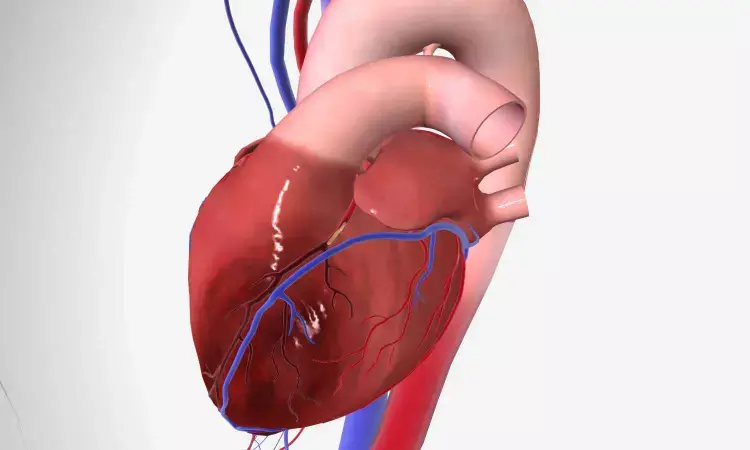- Home
- Medical news & Guidelines
- Anesthesiology
- Cardiology and CTVS
- Critical Care
- Dentistry
- Dermatology
- Diabetes and Endocrinology
- ENT
- Gastroenterology
- Medicine
- Nephrology
- Neurology
- Obstretics-Gynaecology
- Oncology
- Ophthalmology
- Orthopaedics
- Pediatrics-Neonatology
- Psychiatry
- Pulmonology
- Radiology
- Surgery
- Urology
- Laboratory Medicine
- Diet
- Nursing
- Paramedical
- Physiotherapy
- Health news
- Fact Check
- Bone Health Fact Check
- Brain Health Fact Check
- Cancer Related Fact Check
- Child Care Fact Check
- Dental and oral health fact check
- Diabetes and metabolic health fact check
- Diet and Nutrition Fact Check
- Eye and ENT Care Fact Check
- Fitness fact check
- Gut health fact check
- Heart health fact check
- Kidney health fact check
- Medical education fact check
- Men's health fact check
- Respiratory fact check
- Skin and hair care fact check
- Vaccine and Immunization fact check
- Women's health fact check
- AYUSH
- State News
- Andaman and Nicobar Islands
- Andhra Pradesh
- Arunachal Pradesh
- Assam
- Bihar
- Chandigarh
- Chattisgarh
- Dadra and Nagar Haveli
- Daman and Diu
- Delhi
- Goa
- Gujarat
- Haryana
- Himachal Pradesh
- Jammu & Kashmir
- Jharkhand
- Karnataka
- Kerala
- Ladakh
- Lakshadweep
- Madhya Pradesh
- Maharashtra
- Manipur
- Meghalaya
- Mizoram
- Nagaland
- Odisha
- Puducherry
- Punjab
- Rajasthan
- Sikkim
- Tamil Nadu
- Telangana
- Tripura
- Uttar Pradesh
- Uttrakhand
- West Bengal
- Medical Education
- Industry
Persistent Pulmonary Hypertension may not increase postoperative complications in Patients with Dextro-Transposition of Great Arteries Patients: Study

Recent research paper titled "Impact of Persistent Pulmonary Hypertension of the Newborn in Neonates with Dextro-transposition of the Great Arteries" aimed to investigate the effects of persistent pulmonary hypertension of the newborn (PPHN) on perioperative morbidity and mortality in patients with dextro-transposition of the great arteries (d-TGA). The study was conducted as a retrospective observational study at Beatrix Children’s Hospital, University Medical Center Groningen, over a 14-year period from January 2005 to December 2018. The study included 99 consecutive patients with simple d-TGA.
Key Findings
The key findings of the study revealed that PPHN was present in 31% of the patients with d-TGA. Overall mortality in the study cohort was 8.1%, with no significant difference between patients with PPHN and those without PPHN. PPHN did not have a significant impact on morbidity outcomes such as the length of ventilatory support, ICU stay, hospital stay, delayed sternal closure, and resternotomy. Factors like lower birth weight were associated with preoperative mortality. The study also analyzed intraoperative variables like the duration of cardiopulmonary bypass and hypotension, showing an association with longer ICU stay.
Intraoperative Variables and Outcomes
Additionally, the study assessed the association between intraoperative variables like cerebral oxygen desaturation and hypotension and postoperative outcomes. The results indicated that intraoperative hypotension and cerebral oxygen desaturation had no significant impact on mortality. The study also found a positive correlation between the duration of cardiopulmonary bypass and the length of postoperative ventilatory support and ICU stay.
Insights and Limitations
The study provided new insights into the management of d-TGA patients with PPHN, suggesting a more favorable prognosis than previously reported in the literature. The research highlighted the importance of monitoring intraoperative variables and their impact on postoperative outcomes. However, the study had limitations such as its retrospective design, the potential impact of evolving perioperative management over the study period, and the relatively small sample size, which may have affected the power of the analysis. Further studies with larger sample sizes and more focused analyses are recommended to confirm and expand on these findings.
Key Points
- The study aimed to investigate the impact of persistent pulmonary hypertension of the newborn (PPHN) on perioperative morbidity and mortality in patients with dextro-transposition of the great arteries (d-TGA) through a 14-year retrospective observational study at Beatrix Children’s Hospital, University Medical Center Groningen.
- Key findings revealed that PPHN was present in 31% of the patients with d-TGA, and overall mortality in the study cohort was 8.1%, with no significant difference between patients with PPHN and those without it. Factors like lower birth weight were associated with preoperative mortality.
- PPHN did not significantly impact morbidity outcomes such as ventilatory support duration, ICU stay, hospital stay, delayed sternal closure, and resternotomy. However, the study found an association between intraoperative variables like the duration of cardiopulmonary bypass and hypotension with longer ICU stay.
- The study analyzed intraoperative variables like cerebral oxygen desaturation and hypotension, showing no significant impact on mortality but a positive correlation between the duration of cardiopulmonary bypass and postoperative ventilatory support and ICU stay length.
- Insights from the research suggest a more favorable prognosis for d-TGA patients with PPHN compared to previous literature. Monitoring intraoperative variables is crucial for understanding postoperative outcomes. Limitations of the study include its retrospective design, potential changes in perioperative management over time, and a relatively small sample size.
- The study recommends further research with larger sample sizes and more focused analyses to confirm and expand on the findings regarding the management and outcomes of d-TGA patients with PPHN.
Reference –
Marco Modestini et al. (2024). Impact Of Persistent Pulmonary Hypertension Of The Newborn In Neonates With Dextro-Transposition Of The Great Arteries.. *Journal Of Cardiothoracic And Vascular Anesthesia*. https://doi.org/10.1053/j.jvca.2024.09.141.
MBBS, MD (Anaesthesiology), FNB (Cardiac Anaesthesiology)
Dr Monish Raut is a practicing Cardiac Anesthesiologist. He completed his MBBS at Government Medical College, Nagpur, and pursued his MD in Anesthesiology at BJ Medical College, Pune. Further specializing in Cardiac Anesthesiology, Dr Raut earned his FNB in Cardiac Anesthesiology from Sir Ganga Ram Hospital, Delhi.


